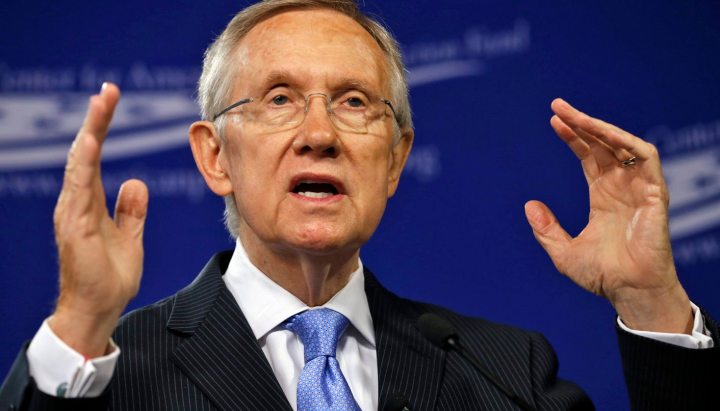Newsdeck
Reid warns of using U.S. Senate ‘nuclear option’ on filibusters

U.S. Senate Majority Leader Harry Reid warned Republicans on Monday that if they do not permit seven of President Barack Obama's executive-branch nominees to be confirmed, he would move to strip the Republicans of their power to stop such nominations using the procedural hurdle called a filibuster. By Thomas Ferraro.
Reid, the top Democrat in the U.S. Congress, threatened to invoke a procedural power play known as the “nuclear option” to change the Senate rules so that a filibuster in the 100-member chamber could be ended with a simple majority vote rather than the current requirement of 60 votes.
The Nevada Democrat said he would seek to change the filibuster rules only on executive-branch posts, not on judicial nominees or legislation.
All 100 senators are due to meet privately on Monday at 6 p.m. EDT (2200 GMT) to discuss their differences and possibly find a way to avert an unprecedented Senate rule change that would dramatically alter how the chamber operates.
The Democrats control the Senate, 54-46.
“The Senate is broken and needs to be fixed,” Reid said in a speech at the Center for American Progress, a liberal advocacy group.
Democrats have accused Republicans of recklessly using the filibuster to block qualified Obama nominees for a variety of job, contributing to political gridlock in Washington.
Reid said he would go to Monday’s meeting, but would not compromise on his demand that all seven nominees – some of whom have waited for a Senate vote for more than a year – be confirmed. He added that the 54-member Senate Democratic Caucus supports his position.
Senate votes are to begin on Tuesday on the seven nominees.
They are: Richard Cordray to be director of the Consumer Financial Protection Bureau; Richard Griffin, Sharon Block and Mark Pearce to be members of the National Labor Relations Board; Fred Hochberg to be president of the U.S. Export-Import Bank; Thomas Perez to be labor secretary, and Gina McCarthy to be head of the Environmental Protection Agency.
Current Senate rules state that 67 votes are needed to change its rules, including ones on the filibuster. But Democrats could do it with 51 votes by rewriting the rule book with a procedural power play known as the “nuclear option.”
Once Democrats switch the threshold on rule changes, they would then reduce to 51 from 60 the number of votes needed to end filibusters on executive-branch nominees.
A LONG HISTORY OF FILIBUSTERS
Filibusters have long been part of the Senate’s basic fabric, providing the chamber’s minority leverage to extend debate and force the majority to compromise.
But in the past decade or so, both parties – when in the majority – have accused the minority party of misusing the filibuster to produce partisan gridlock, not productive change.
Senate Republican Leader Mitch McConnell has denied that his party has obstructed nominees, noting that more than 1,500 of Obama’s picks had been confirmed, many overwhelmingly. McConnell has accused Democrats of getting ready for “a power grab” by moving to “change the rules by breaking the rules.”
Reid contends that the Senate can set its own rules, and that the U.S. Constitution states that a simple majority is all that is needed for most Senate action, including confirmation of nominees.
“The Founding Fathers wanted an up-or-down vote, and that’s basically what we have been crying for now for years,” Reid said.
The Constitution calls for a super majority only in certain instances, for example to impeach a president, override a presidential vote, ratify a treaty or approve a constitutional amendment.
In a brief question-and-answer session after his speech, Reid was asked if Republicans could avert a rules change by confirming at least some of the nominees.
“No,” Reid said, adding that his demand for all seven was non-negotiable.
“No one questions their capabilities, their credentials, their integrity,” said Reid, who accused Republicans of blocking them merely because they do not like the agencies they would head.
“We want to make a simple change. It will apply to whoever is our next president, Democrat or Republican. It will apply to President Obama,” Reid said. DM
Photo: Senate Majority Leader Harry Reid (D-NV) speaks about “Ending Senate Gridlock” at the Center for American Progress Action Fund in Washington July 15, 2013. REUTERS/Kevin Lamarque




















 Become an Insider
Become an Insider